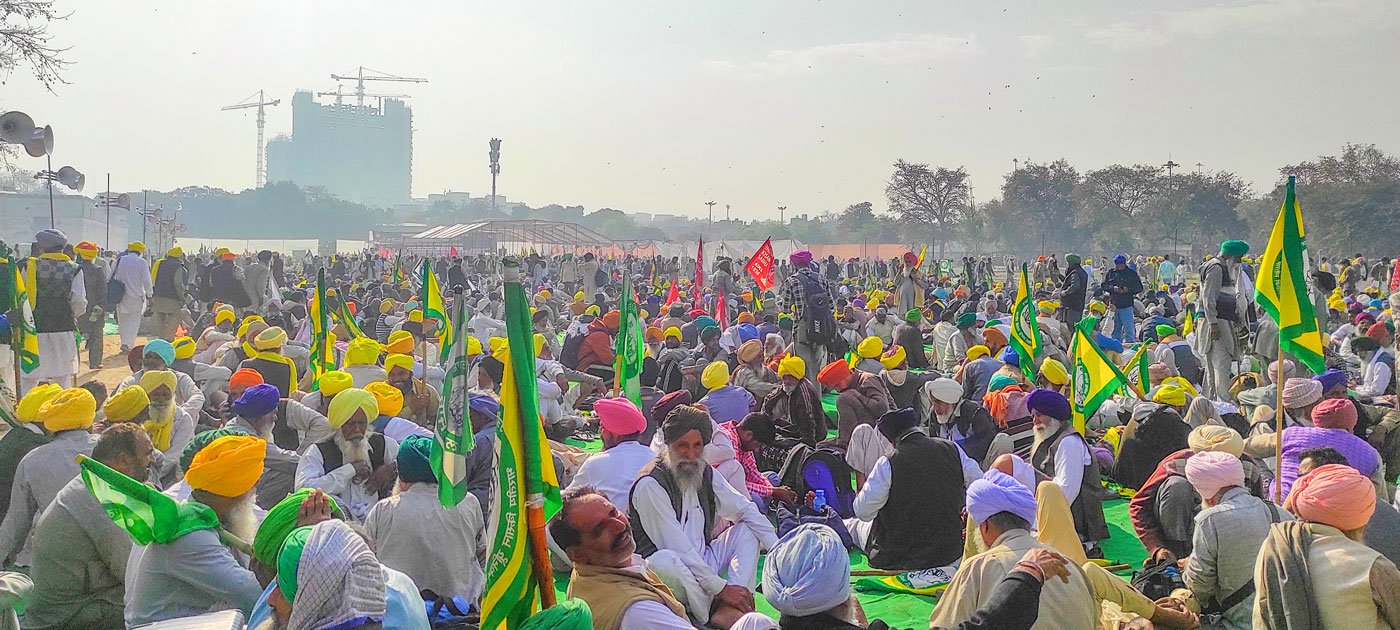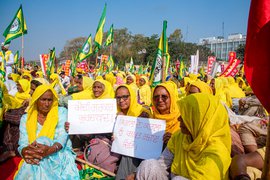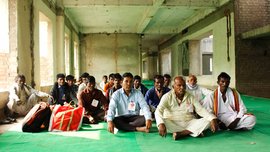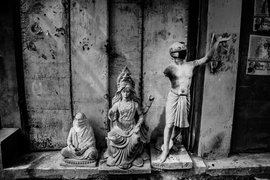Dilli hamari hai!
Desh par vohi raaj karega,
jo kisan mazdoor ki baat karega!
[Delhi belongs to us!
Only those who work for farmers and workers,
will get to rule the country!]
This was the rallying cry of thousands of farmers gathered for the Kisan Mazdoor Mahapanchayat, held on Thursday March 14, 2024 at the Ramlila Maidan in the country’s capital, New Delhi.
“We had come to the Tikri border during the
year-long protests three years ago [2020-21],” a group of women farmers from
Punjab’s Sangrur district told PARI at the Ramlila grounds. “We will come again
if we have to.”
![Women farmers formed a large part of the gathering. 'We had come to the Tikri border during the year-long protests three years ago [2020-21]...We will come again if we have to'](/media/images/02-1710414322999-01-NW_and_RM-Lohars_in_So.max-1400x1120.jpg)
Farmers and farm workers walking into the Ramlila Maidan for the Kisan Mazdoor Mahapanchayat, held on Thursday March 14, 2024 in the country’s capital, New Delhi
![Women farmers formed a large part of the gathering. 'We had come to the Tikri border during the year-long protests three years ago [2020-21]...We will come again if we have to'](/media/images/03-1710413597822-01-NW_and_RM-Lohars_in_So.max-1400x1120.jpg)
Women farmers formed a large part of the gathering. 'We had come to the Tikri border during the year-long protests three years ago [2020-21]...We will come again if we have to'
Roads close to the Maidan were lined with buses that had brought farmers from Punjab, Haryana and parts of Uttar Pradesh. At 9 a.m., in places on the footpath lining the roads to the historic maidan, behind parked buses, small groups of men and women were winding up their breakfast of rotis cooked on makeshift stoves of wood fire and bricks.
It was ‘their’ village on this electrifying morning – men and women farmers marched into the Ramlila Maidan bearing flags. The air reverberated with ‘ Kisan Mazdoor Ekta Zindabad [Long Live Farmer Worker Unity]!’ By 10:30 a.m. the green, woven polythene sheets spread out on the ground were filled up in an orderly manner; hundreds of farmers and farm workers sat down in readiness for the Kisan Mazdoor Mahapanchayat (farmers and workers mega village assembly) to begin.
Gates to the Ramlila grounds were only opened in the morning, the authorities saying that there was water logging on the grounds. Farmer leaders allege that there was a deliberate attempt to flood the ground with water to obstruct the meeting. The Delhi Police who take orders from the Union Ministry of Home Affairs, had suggested that the gathering be limited to 5,000 people. However nearly ten times that number of determined farmers were present at the grounds. There was also substantial media presence.
The session began with a moment’s silence in memory of Shubhkaran Singh, the farmer from Balloh village in Bathinda district who died on February 21, having suffered a fatal head injury at Dhabi Gujran in Patiala, after police showered the protesting farmers with tear gas shells and rubber bullets.
Dr. Sunilam, the first speaker at the
Mahapanchayat read out the Sankalp Patra or Letter of Resolve of farm union,
Samyukta Kisan Morcha (SKM). There were over 25 leaders of the SKM and allied
organisations on stage; Medha Patkar was present among the three women leaders
there. Each spoke for 5 to 10 minutes on the need for a legal guarantee for
MSP, as well as other demands.
![The air reverberated with ‘Kisan Mazdoor Ekta Zindabad [ Long Live Farmer Worker Unity]!’ Hundreds of farmers and farm workers attended the Kisan Mazdoor Mahapanchayat (farmers and workers mega village assembly)](/media/images/04-20240314_092304-NW_and_RM-Lohars_in_Son.max-1400x1120.jpg)
![The air reverberated with ‘Kisan Mazdoor Ekta Zindabad [ Long Live Farmer Worker Unity]!’ Hundreds of farmers and farm workers attended the Kisan Mazdoor Mahapanchayat (farmers and workers mega village assembly)](/media/images/05-1710413507878-01-NW_and_RM-Lohars_in_So.max-1400x1120.jpg)
The air reverberated with ‘Kisan Mazdoor Ekta Zindabad [ Long Live Farmer Worker Unity]!’ H undreds of farmers and farm workers attended the Kisan Mazdoor Mahapanchayat (farmers and workers mega village assembly)
Farmers have been raging at the repressive actions of the government, the use of tear gas shells and lathi charges on protesting farmers in February 2024 at the Shambhu and Khanouri border between Punjab and Haryana. Read: ‘I feel imprisoned at Shambhu border’
In response to the physical barriers and restrictions placed by the government on farmers entering the capital, a speaker gave a fiery call: “Dilli hamari hai,. Desh par vohi raaj karega, jo kisan mazdoor ki baat karega ! [Delhi belongs to us and only those who work for farmers and workers will get to rule the country].
Leaders of farmer and labour unions from Punjab, Haryana, Uttar Pradesh, Karnataka, Kerala, Madhya Pradesh and Uttarakhand called out for punishing the current government in opposition to the ‘Corporate, Communal, Dictatorial Regime.’
“After January 22, 2021, the government has not talked to farmer organisations. When there haven’t been any talks, how will the issues be resolved?” said Rakesh Tikait in his speech. Tikait is the National Spokesperson of the Bharatiya Kisan Union (BKU) and a leader in the SKM.
“At the end of the farmers’ struggle in 2020-21, the Narendra Modi government had promised that there would be an MSP [minimum support price] Legal Guarantee at C2 + 50 per cent. That has not been implemented. They had given a guarantee that a loan waiver would be given, that has not been done so far,” said Dr. Vijoo Krishnan, General Secretary of the All India Kisan Sabha (AIKS). Read PARI’s full coverage of the farm protests .
Krishnan, while speaking from the podium,
mentioned the more than
736 farmers who died
during the year-long farmers’ protests, and how the
government had still not fulfilled promises of compensation to their families, and
the dropping of all cases against them.
“The Electricity Act amendments was to be withdrawn, which has not been
done,” he added, speaking to PARI at the Mahapanchayat.


There were over 25 leaders of the Samyukta Kisan Morcha (SKM) and allied organisations on stage; Medha Patkar was present among the three women leaders there. Each spoke for 5 to 10 minutes on the need for a legal guarantee for MSP, as well as other demands. 'After January 22, 2021, the government has not talked to farmer organisations. When there haven’t been any talks, how will the issues be resolved?' asked Rakesh Tikait, SKM leader (right)
Later, Krishnan also brought up the SKM’s opposition to the continuance in office of the government minister Ajay Misra Teni whose son, Ashish Misra allegedly mowed down five farmers and a journalist in Lakhimpur Kheri, Uttar Pradesh.
Tikait said the andolans (protests) going on at many places across the country “will continue no matter which party gets elected in the forthcoming general elections, until the issues of farmers and workers are resolved.”
At the end of his short talk, Rakesh Tikait called
on everyone to raise their hands to pass the resolutions of the Mahapanchayat.
At 1:30 p.m., the thousands of farmers and workers gathered there raised their
hands along with flags. Turbans, scarves, caps in red, yellow, green, white and
blue stretched as far as the eye could see under the bright sun at the historic
Ramlila Maidan.



